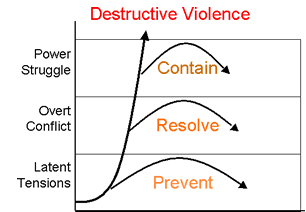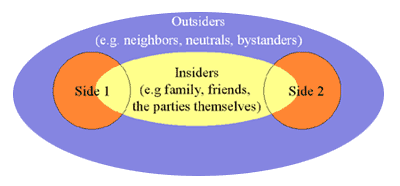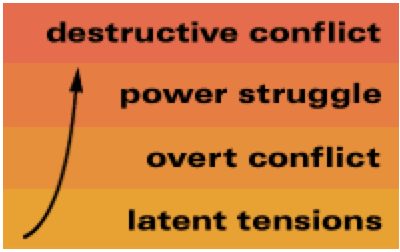Arbiter – Determine Disputed Rights
Sometimes mediation is not enough to resolve a dispute or is not appropriate because basic rights are being violated. Whereas a Mediator can only suggest a solution, an Arbiter can decide what is right. The Arbiter is a familiar role, embodied in the judge in the courtroom or the arbitrator in a work setting. More informally, the Arbiter is the teacher deciding a dispute among two quarreling students, the parent ruling on a matter involving two children, or the manager determining an issue among two employees. In this sense, we are all potential arbiters.
Replace destructive conflict
Adjudication stands as one of humanity’s great social inventions if only because it provides an alternative to the violent resolution of conflicts.
Adjudication does not always require the intervention of the state, however, but can be arranged simply through the consent of the parties. They can agree in advance to accept the binding decision of a trusted third party, jointly selected, to whom they then present their case. This private form of adjudication – called arbitration – is widely used to resolve commercial disputes, both domestic and international, as well as employee grievances. Indeed, ninety-five percent of all collective bargaining contracts in the United States provide for arbitration of employee grievances.
Arbitration can also be employed to end wars:
- After Peru and Ecuador fought a brief but intense war in 1995 over their border, international mediators worked hard but proved unable to procure a complete agreement. Finally in 1998, under international prodding, the presidents of both countries agreed to seek arbitration by the four guarantors of a prior 1942 treaty: Brazil, Argentina, Chile, and the United States. To everyone’s surprise, the legislatures of Peru and Ecuador consented in advance to accept the decision of the four guarantors. With nationalist passions still running strong, political leaders felt it easier to accept a ruling by others than to make direct concessions to the enemy.
To play the role of Arbiter, we need not necessarily be superior in status or power to the parties but may simply be the parties’ peers.
- “Peer pressure seems to be the most important factor in whether a kid commits a crime,” explained volunteer judge David Silverstein to the defendant, a thirteen-year-old boy who had stolen two packs of cigarettes from a WalMart store. “Here you have a whole room of peer pressure, trying to turn you around.” Silverstein was referring to the six jurors in the case, all between the ages of ten and seventeen. After hearing from the boy, the six collectively decided on his “punishment”: to perform twenty-eight hours of community service, make an apology to the store, and write two reports, one on the effect of stealing on the community’s economy, and the other on the health hazards of smoking. They also directed him to serve as a juror himself on eight cases so that he could help the system that had helped him. Far from ostracizing him, then, they included him. “It’s a second chance,” the boy declared afterwards.
- “Since the inception of our youth court in 1983,” reports police sergeant Gordon Ferguson, “our numbers [of juvenile crimes] have gone down drastically.”
The Arbiters’ goal, in such cases, is not just to determine who is right and who is wrong but to repair the harm to victims and to the community, and to reintegrate the offender as a constructive member of society. What works with teens works with adults as well. Hundreds of community courts have recently been established, part of a growing trend toward the restorative and compensatory justice long practiced in simpler societies.
- In Vermont, for example, citizen volunteers on Community Reparative Boards sentence nonviolent adult offenders to make amends to their victims and perform community service work. “They’re trying to help, and not screw you over,” explains one offender. “They have you think about what you did. I’ve learned a lot from it.”
Promote justice
Peace is not the only aim of the Arbiter – so is justice. A ruling offers the community a chance to send a message about right and wrong.
Parents have an opportunity to reaffirm the principles of fairness when adjudicating among their children:
- Seven-year-old Chip, who shared a bedroom with his five-year-old brother Tony, announced one day that he would move to a separate bedroom. Terrified at the prospect of being left alone in the dark, Tony agreed to pay Chip his entire weekly allowance if Chip stayed. When their parents discovered the arrangement, however, they immediately stopped the transaction and used the occasion to teach both boys how wrong it was to use money in such a situation. They asked Chip to decide where he wanted to sleep without financial inducements. Chip chose to continue sharing the bedroom with Tony out of brotherly concern alone.
By promoting justice, courts might also one day deter political violence. Domestic courts have already begun to extend their jurisdictions to hear cases involving crimes against humanity committed elsewhere in the world.
- One instance made worldwide headlines in the fall of 1998: Chilean ex-dictator Augusto Pinochet was arrested in Britain at the request of a Spanish magistrate for his involvement in the torture and murder of thousands of political opponents during the 1970s.
- Spurred by the massacres in Bosnia and Rwanda, and building on the precedent of the Nuremburg Tribunal, a hundred and twenty nations agreed in July 1998 to establish a permanent international criminal court in order to deter those who would commit genocide, aggression, and other crimes against humanity, such as mass rape and the forced recruitment of children as soldiers. Eighteen judges from eighteen different countries will serve terms of nine years each. While the court’s effectiveness remains to be seen, its establishment is a critical first step.
Encourage negotiation
By deciding who is right and who is wrong, however, an Arbiter runs the risk of further straining the relationship among the parties. Paradoxically then, the role of Arbiters is to encourage a negotiated settlement whenever possible and appropriate. Bosses can urge disputing employees who come to them for a decision to try first to resolve the matter by themselves, or a judge can take the parties into her chambers and instruct them to attempt mediation before returning. To assist the parties, the Arbiter can even suggest a standard or procedure of fairness to be employed in their settlement talks. A manager can specify the cost and quality criteria he wants met by two departments arguing about a product design. Or a parent can tell two children quarreling about a piece of cake: “Okay, Johnny, you cut the cake, and Mary, you get first pick.”
Resources
- Global Arbitration Mediation Association, Inc.
- National Arbitration Forum
- American Arbitration Association
- Community Courts
- International Arbitration Database
Brief bibliography
- Elkouri, F., E. Elkouri, M. Volz, E. Goggin. (1997) How Arbitration Works: Elkouri and Elkouri Fifth Edition. BNA Books.
- Goldberg, S., F. Sander, and N. Rogers (1992) Dispute Resolution: Negotiation, Mediation, and Other Processes Second Edition. Boston: Little Brown.
- Goodman, A. (1993) Basic Skills for the New Arbitrator Solomon Publications.
- Ury, William (2000). The Third Side:Why We Fight and How We Can Stop. New York: Penguin.




